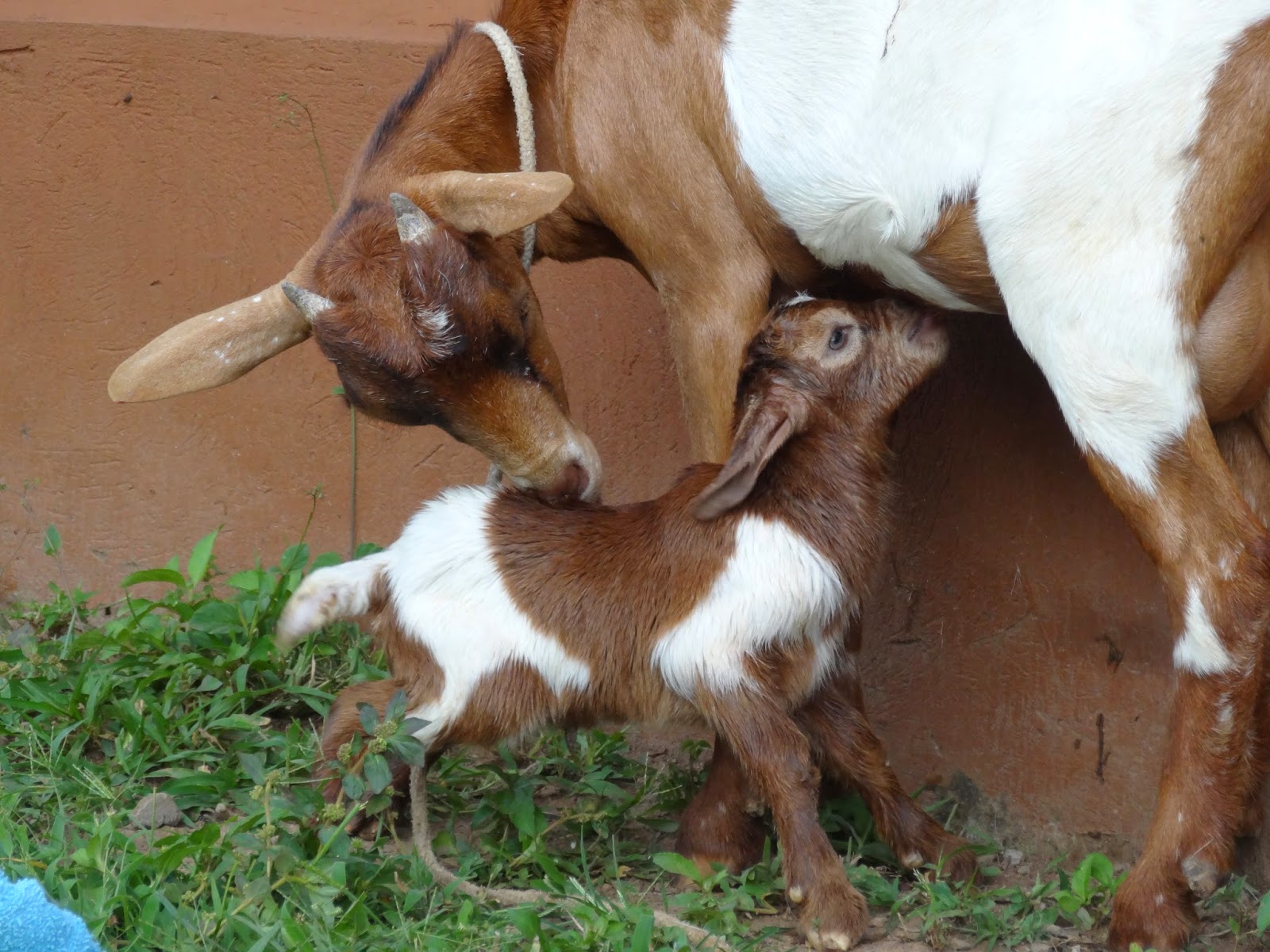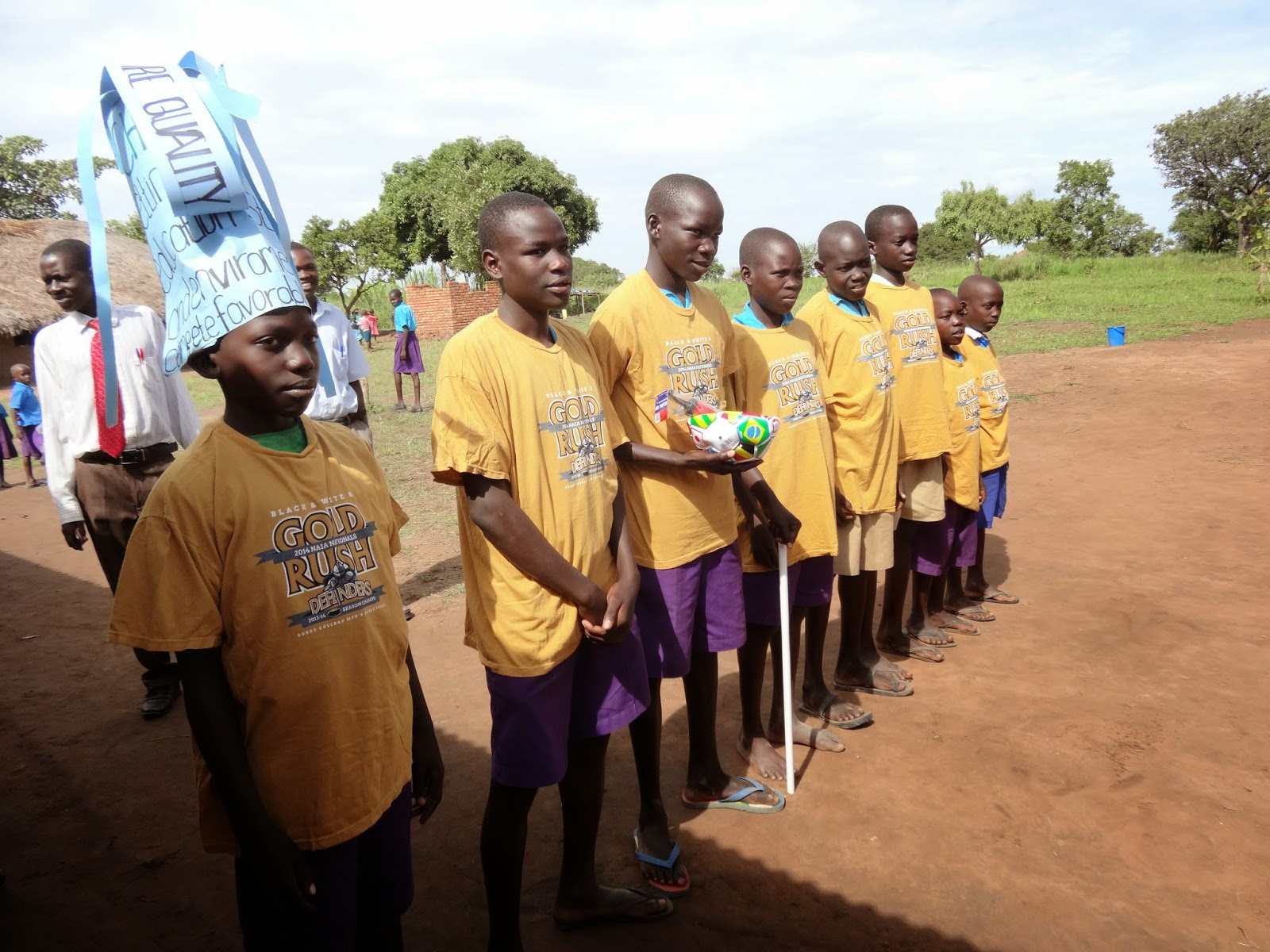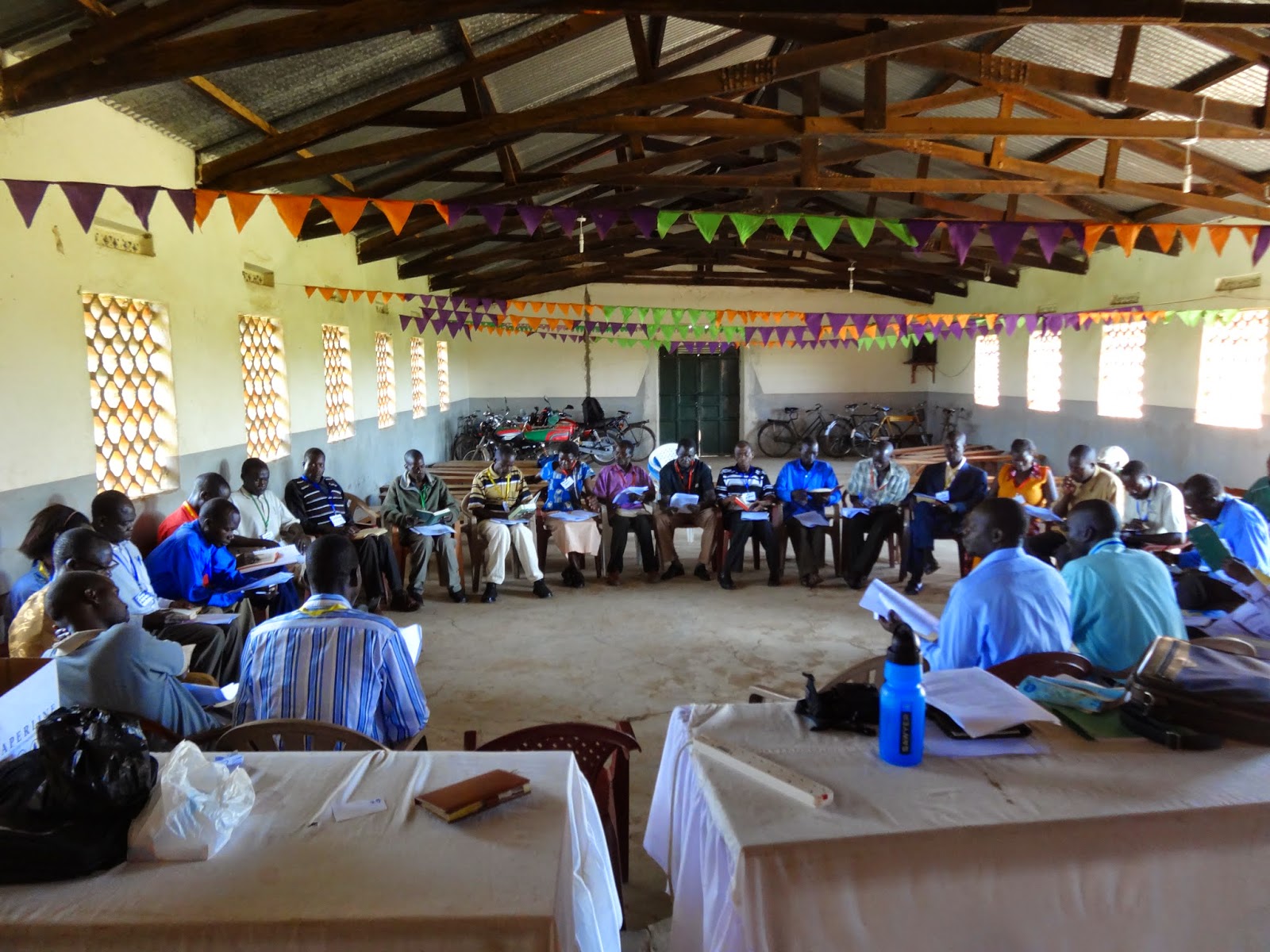Last week, from Monday to Friday I taught Timothy Leadership Training - Manual 1 - "Caring for God's People" in Amuria for pastors and leaders from all over Amuria district. I don't want to make this post longer than it already is, so if you do not know about TLT you can read some other posts about it. For example -
Timothy Leadership Training Part 1. Here is a photo of our group.
It was an incredibly meaningful time for me, but I was exhausted by the end. I drove back and forth each day, leaving at 6:40am and getting home 12 hours later. Driving here is exhausting because of potholes and bad drivers and muddy roads, but we have a good vehicle. I made it through a muddy patch of the road where there were five other vehicles stuck. When you drive, every time you end up driving lots of other people too (whether friends or people from the side of the road), which adds extra time to drop people off. In the future, I think I will spend the night in the places where I am training.
I took Martin Atiko with me, one of the participants soon to graduate from the Soroti TLT group. He is not a pastor, but he is a gifted church leader. He came to help me lead the training, as it was a good opportunity for him to learn from my example. I would venture to say I learned as much from him as he did from me as he inspired us with TLT testimonies, and helped me organize the group well. Martin sacrificed a week of construction work (which means giving up money for his family), in order to come train with me. Here is Martin with me in the photo below. Normally he has a huge smile on his face all the time, but it's hard to get Ugandans to smile for pictures! He was so glad to be there and wants to come with me to all the remaining TLT manuals in Amuria.

As I've talked about before, training and equipping pastors in Uganda is vitally important. In Katakwi/Amuria pastorate there are 400 pastors and 189 churches in PAG (Pentecostal Assembles of God). Out of those pastors, only 29 have received Bible school education. Most of the pastors are leading their churches while being completely untrained. I will be doing TLT in both Amuria and Katakwi districts. The TLT program recently changed and is now only six manuals instead of seven. So it will take six full weeks in each place to be finished so that people graduate as master trainers. Then they can go on to start new groups of their own. (These are not the only places I will be doing TLT). The plan is to graduate all my TLT groups before our two year term in Uganda is finished.
When I arrived on Monday to begin, only the coordinator of teaching in the pastorate was there, George William. He is wonderful to work with, and was one of our former students. It is such a blessing to work with people like him, who we already know. Here is a photo of us.
So everyone showed up late. They were supposed to arrive Sunday night, but we did not actually start until around 11:00am on Monday. I expected sixty people at 8:00am, so the morning was very frustrating. But by the time everyone arrived we had 33 participants which is a good size for discussion. Part of TLT is about time management and after everyone arrived we made clear that coming late like this could not happen again. They now know that when we begin the next manual, if I arrive and no one is there, I will immediately go home and that is the end of the training.
Martin and I got through to them that TLT is a serious training, not just a workshop. It teaches you responsibility and planning. They had to learn to be time conscious. The group members themselves made rules which will remain throughout all of our trainings. If a person arrives late, he or she has to pay 500 shillings (about 25 cents, but it's a lot for them). If they arrive late three times without valid excuses, they are out of the training. If your phone goes off during the meeting, you have to pay 500 shillings. We had someone designated as a timekeeper/tax collector. I realize that this is extremely counter-cultural. Arriving late is just what you do. But they are learning to manage their time, as time is a gift and resource God has given to us. Some people had to pay shillings throughout the week, but on Tuesday morning everyone was ready to start by 7:30am, when we were scheduled to start at 8:00am! Later I learned that these rules about time were one of the things they appreciated the most.
TLT in Amuria was different than in my past TLT experiences because everything had to be translated, making reading and discussion twice as long. To save time, we had the Bible verses only read in Ateso. We had four people take turns translating everything else and they worked hard. These videos give you a sense of what the discussion and reading was like, though usually it was much more animated than this, with at least five people wanting to be called on to speak at any given moment.
This manual covers pastoral care, visiting, comfort, guidance, healing, and reconciliation among other topics. They learned the importance of listening well before speaking and giving guidance. They learned the importance of saying "
I don't know" when giving guidance or preaching instead of always trying to give an answer. Culturally this is very difficult and in our experience (say for example, if you ask someone for directions) if they don't know, they will still pretend to know and tell you something, so you get more lost than you were to begin with.

Healing was an intense discussion. At the beginning it seemed that most people sort of thought that God heals every time if we have enough faith. But after much discussion and digging into scripture, I don't think anyone continued to believe that. This is important as many people in this culture do not admit when they are sick for fear of being judged to not be a true Christian or that God is punishing them. At the same time, it is clear that God heals and I heard many personal testimonies of miraculous healing which was very encouraging.
Also in the healing discussion we talked about how God can heal miraculously or through medicine, but either way it is He who provides the healing. This was an important discussion as some people in PAG churches out in the villages still reject hospitals and think that to use medication means you lack faith. After the fear of admitting sickness or taking medication was gone, we found out that many of our group members struggle with blood pressure problems. One of the group members is the mayor of Amuria, and he has been trained to test people for blood pressure, so the next morning he tested everyone to see how they were doing and give them health advice!
I added a little something to this training that is not normally a part of TLT. It was a handout from one of my pastoral care classes in seminary, about listening and empathy and the variety of ways to respond in a pastoral care visit. They really appreciated it and I had the impromptu idea to have a drama to analyze and detect the various techniques outlined in the handout. The actors did a wonderful job!
Here is a video of us singing together. Every morning someone led devotions.
Here is a photo of Bishop Charles of this pastorate. He's already taken this first manual before, but he did it again to be an example to the other pastors. He plans to teach this first manual to some 10-30 other pastors in Amuria who missed this week of training.
Central to Timothy Leadership Training is making action plans. The action plans they made this time are all related to pastoral care. They will carry them out over the next three months before our next training. Here they are putting the final drafts up on the walls.

I am very excited about their plans! May God bless them and empower them to carry them out. Most of the plans involve the members teaching this pastoral care manual to people in their churches. Some are just teaching specific lessons, and some are going to teach the whole manual. This type of action plan we encourage the most because it will spread knowledge and inspire action among the many more people who will be trained. Other action plans involved making more regular visits to the Christians in their churches. Some are trying to reconcile broken marriages in their church. One lady has a plan to visit prisoners monthly to share about God's comfort and proclaim the Gospel to them. Another pastor has planned to visit those that left the church, in the hopes that they will return to the church and to God. One pastor has identified four different community conflicts in his area involving health crises or land disputes and is going to work on reconciliation between the groups. The mayor's plan is very detailed and thorough; he plans to identify and help ten households in Amuria town suffering from malnutrition, not only giving them food, but training and seeds. (The mayor is an interesting guy, he used to be a child soldier.)
Here we are praying over action plans. One person is the main person praying each time, but as you can see, everyone loves to join in with the prayer!
Not everyone brought the full amount of money they were supposed to, so we had a debt for food by the end of the week, but some generous group members made up for it. Next training, the group decided you cannot come at all unless you bring the full amount you are supposed to. They were encouraged to make an extra action plan of saving the money in the months between now and the next training. The training is only about $5 for them and that includes the manual, the food, and accommodation. But this little amount is a challenge for pastors who get less than that much from their church in a whole month and have to support their families as well.
I have received so much positive feedback and testimony about this training. They were prepared to go home and brag about it to all the people who couldn't come, but they decided that humility is the better route. I encouraged them that some day soon they can teach the people themselves who could not come. It would be wonderful if somehow the manuals were translated into Ateso so that these people can teach others in Ateso. Here is a picture of almost our whole group, but several people are missing who had to leave right before we took the photo.
Let me share some testimonies.
One lady of the group, Stella, is not a pastor. She is a member of Amuria town church (pictured above) and did not know ahead of time about the training. Sunday night she had a dream about being in a meeting at church with certain other members. She knew it was important and so the next morning she came over to the church to talk to the pastor about it and found out about TLT and joined us in fulfillment of her dream.
One older pastor shared - "This training is not worth the small amount we paid for it. We should have paid so much more for how much we are learning."
Here are some written testimonies:
"I send my appreciation to you for what you have done to us all and mostly I myself. May the Lord our creator bless you on his work you have been doing to his workers."
"If I was to give the training a percentage, it would be 100% so may God bless you Anthony and Martin."
"I am so grateful to have this opportunity of attending this training because it has enlarged my vision in God's work. It has given me hope of success in God's call."
"I am so gratefully happy to TLT for opening my eyes for my leadership."
"This training has really changed the way of my thinking and the way of doing things in God's work and in my family. So therefore I recommend it to continue even expecting more of its kind to come."
"Glory to God and thanks to Anthony and Martin, May God bless you abundantly for having labored a lot to help God's people."
Last, a random tidbit. On Monday we ate a special food, emolokon, at a local restaurant owned by one of the participants, since the kitchen staff were not there yet. Emolokon is boiled cow meat, including the skin. It's only certain parts of the cow, like the tail, or the joints. I ate some of it but it was very difficult. I had the knee joint I think (it was huge). Other than the fatty skin, it was only fat. There was not even half a bite of what we would call meat. Just globules of fat and skin. The skin tasted good. It's a good thing I ate it though because later I was praised in front of the group as the only muzungu they had ever heard of who was willing to eat it! I failed to get a photo.
Praise God for this week of training! And there are many more to come!


















































